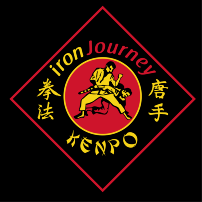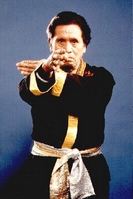WILLIAM CHOW: The Lost Interview
|
by Jim Perkins
William Chow, circa 1984 In 1986 I spent five months in Honolulu. One reason I moved there was I hoped it would give me an opportunity to meet professor William “Thunderbolt” Chow. I’d trained in the Alo system of Hawaiian kenpo (the late Ron Alo was a second-degree black belt under Chow), and having heard many stories about the man behind “Chinese kempo of kara-ho karate,” I was excited about the prospect of meeting him. Before I knew it, there I was at the church fellowship hall where he taught, handing him a letter of introduction from Alo. The professor was short yet thick and strong despite having had a serious gallbladder operation a few years earlier. His fingers were as big around as my wrist. When he finished, he tossed the letter onto a table and growled, “Yes, I know Alo—and I no like him!” With that, he pounded the table a few times, and it nearly collapsed from the beating. I tried to calm him down, but he walked away and began teaching. Only two students were in the class: Walter, a yellow belt, and Jacob, a black belt who wore a kung fu uniform. A few visitors in street clothes tried to persuade me to leave with some rough language and chair kicking, but I refused and stayed to watch the class for the next three hours. At the end of the night, everyone left without even glancing my way. I went home disappointed and called my teacher. He thought it was amusing that they had threatened me. I asked: “Why are you laughing? He hates you, too.” Alo laughed even harder and told me to go to the next class. Against my better judgment, I returned two days later and was greeted in a different manner. They were all shocked to see me, especially Chow. It hadn’t been an act; he truly didn’t want outsiders from the mainland exploiting the art he taught. However, because I did come back, they believed I wasn’t as much of a “howlie” (Hawaiian slang for white person, meaning “toilet paper”) as they had thought. At first, it was difficult to speak with Chow because he seemed so mean and ornery. However, my thirst for martial arts knowledge and history drove me to pester him with hundreds of questions, many of which he would ignore, smile or just shrug off. Chow finally saw the sincerity with which I had asked about his life and his art. One evening, he showed up at class with two grocery bags full of photographs—his photo albums, I guess. He started pulling out old pictures and telling me about them. He had snapshots of everyone from James Mitose and Adriano Emperado to Ed Parker and Nick Cerio. That night, the conversation was more like an interview. I wrote down all I could remember as soon as I got home. The following is the transcript of that lost interview from 1986. Keep in mind that Chow was a very emotional person who held grudges—some deserved and others probably not. He was a true character with a one-of-a-kind personality. The things he said reflected how he felt at that moment, but they may not always have been an accurate representation of his true feelings. Black Belt: Professor ... how did you get the title of “professor”? What exactly does it mean? BB: Well, I mean I don’t understand how to get that title. How would I get to be a professor? BB: No, I was just wondering. BB: No, I don’t want that. On your flier it reads, “Professor William Chow, 15th-degree black belt, Chinese Kara-Ho Kempo Kung Fu.” So you’re a 15th degree? BB: Well, I know you’re the head of the system and all, but I didn’t know there were 15 degrees. BB: I’ve heard that 10th degree is the highest. BB: Oh, I see. OK. Do you have any pictures of Mitose in there? BB: Yeah. Is that Mitose? BB: Hmm. He looks mean. BB: Oh. Uh ... cool. BB: Hmm. BB: Wow. These are incredible! So you got your black belt from Mitose? BB: Really? BB: Really? What kind of demonstrations? BB: Oh, man! How did you do that? BB: It was fake? BB: Did you ever break a bat over Mitose’s shin? BB: Wow. BB: Yeah, Ed Parker. BB: Oh, yeah. Everyone knows him. They call him the Father of American Karate. BB: I guess. BB: Yes, of course. But I don’t think he thinks he’s the king. BB: But he’s one of your black belts. BB: So he didn’t train under you? BB: When you retire, is there someone you want to take over your system? BB: What rank is he now? BB: Then how about me, Professor? BB: When I go back to the mainland in a few months, who can I go to to learn true kara-ho? BB: OK. I guess Alo doesn’t teach true kara-ho. He’s kind of changed to his own style. Is that why you don’t like him? Photo 1: William Chow, circa 1984 About the author: Jim Perkins is a Nixa, Missouri-based free-lance writer and a sixth-degree black belt in keokin kenpo. |

